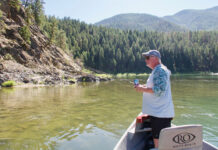When it comes to marketing your brand, a brand ambassador program can be hugely beneficial. Or it can be a giant disappointment. More and more I’m hearing the latter from craft distillers, which is a frustrating waste of time and money for everyone involved. As with any marketing tactic, building a brand ambassador program that works is all about setting clear objectives and defining success metrics from the start. But before you can do that, it’s important to understand why you might need brand ambassadors, what they really do and the traits that make up the great ones you want to hire.
Why You Need a Brand Ambassador
A brand ambassador, at the core, is the embodiment of your brand in real life. That brand story and voice you’ve worked so hard to get right (haven’t done that yet? Check out “Make Your Marketing Work Harder” on pg. 92 of the Distiller Fall 2019 issue to get started) and to infuse into all of your marketing? Your ideal brand ambassador brings that to life: the way your brand feels, looks, sounds, what it stands for and the kind of personality it would have as a person. And they do it in a way that connects deeply with your target consumer. When they’re talking with consumers, they have a natural connection and spark that feels mutual, and when they’re talking with the trade, they sound like the type of consumer the bartender knows typically enjoys your brand. And that means they are able to educate, entertain and increase interest in your brand on both sides of the bar.
Brand ambassadors are a key part of your marketing and sales teams and, some might argue, can even replace them if you build your brand ambassador program correctly. Instead of having different people in silos responsible for different parts of the consumer and customer life cycle, a great brand ambassador can take the lead for the entire life cycle.
What a Brand Ambassador Does
The answer depends on you! Your brand’s goals, resources and needs should define how you scope your ideal role. A challenge with figuring out what your brand ambassador role should look like is that this position is unique to every brand. You can’t just rip off and reapply what others are doing. Even within the mass, conglomerate spirits companies, the brand ambassador role can vary greatly from brand to brand, which means you have to get clear on what you’re trying to achieve, how you’ll measure success and what kind of resources you’re willing to invest.
Once you’re clear on that, it’s time to make some decisions and start defining the scope of your brand ambassador role:
- Is this a part-time or full-time role?
- Are your ambassadors responsible for marketing goals, sales goals or both?
- Are they consumer-facing, trade-facing or both?
- Are they simply executing ideas, or developing and executing their activities?
- Is their work ongoing or campaign-based?
A great brand ambassador (who ends up really being worth the money and training time) covers a lot of different responsibilities, often about 25% administrative/desk work, 30% interacting with consumers directly, and 45% interacting with the trade. What exactly are they doing in those areas? Here are a few examples of some of the bigger work streams that great brand ambassadors cover:
- Develop educational materials and programming ideas
- Educate consumers, bartenders, retailers, journalists, sales reps, etc.
- Develop pitches, marketing campaigns and promotional materials
- Create cocktails and other creative elements to showcase your brand
- Design and host events and promotions for consumers and trade
- Create content to share with their own social media audience
- Secure media placements, attract influencers and create buzz
- Are the face/voice of your brand in interviews or articles
- Attend events and competitions on behalf of your brand
- Meet with your brand marketing and sales teams to share and collaborate
- Provide feedback on new products and marketing
- Report on their success metrics and expenses and handle other administrative necessities
These are all important considerations when creating your brand ambassador program since it will vastly impact who you hire, how you compensate them (see sidebar) and how you measure their success.
Traits of Great Brand Ambassadors
Who should you hire? Quite candidly, I often see craft distillers make missteps at the hiring stage. Some enthusiastic brand fan approaches them excitedly about being a brand ambassador, says they’d love to cruise around town and on social media and wax poetic about their brand, and as small businesses always looking for low-cost resources, it sounds like a win-win! So, they figure out some way to fairly compensate for their time, put a few guidelines in place and then hope for the best. And then… crickets. And then I’m hearing stories about how brand ambassadors are a waste of time and money.
Well, with that approach they certainly are. Gone are the days of shots girls or passive barstool plants if you want any real measure of success. While to many, the role of brand ambassador still seems like a veiled excuse to party, it’s a serious and taxing job when done correctly by a professional. Essentially, you’re looking for candidates who have the following key qualifications and traits:
- At least a few years of experience as a brand ambassador or as a great bartender
- Makes a great first impression, feels in line with your brand and represents your target consumer
- Lots of industry relationships and contacts, especially in the markets they’ll be working
- Knowledge across your entire category, and ideally related categories (WSET certifications or similar credentials are great!)
- Good public speaker and conversationalist, with a talent for educating in an entertaining way
- Self-starter with energy, drive, hustle and ideas of their own
- Ability to read an audience, adapt and roll with the punches
- Organized, efficient and responsible with follow-ups and multiple deadlines
- Experience planning events
- Strong online presence
- Good writer and content creator
- Has marketing or sales experience (depending on how you scope the role)
While that certainly isn’t an exhaustive list of hiring criteria, it does cover many of the traits that are often missing from unsuccessful brand ambassadors working with small craft brands. And on the first point: Bartenders really do make some of the best brand ambassadors, if you can find one looking for a change. They need to develop many of the key traits in order to be good at their existing job.
Now that we understand what a brand ambassador does, how many different ways you can scope the role and what key traits make a great one, it should be clear that, when done right, a brand ambassador program can be hugely beneficial to your brand. Brand ambassadors are completely focused on getting others excited about your brand to drive awareness, interest and potentially even sales (if that’s part of their role).
This role can be so valuable that some believe we should start replacing traditional sales reps and marketing experts with brand ambassadors exclusively. Why? Times have changed. We now live in a world where basic product facts and data are at everyone’s fingertips, but storytelling, education, entertainment and palpable enthusiasm are what really sell both consumers and trade. And that’s also what defines great marketing today. Breaking down barriers between information and empowering individuals to own the entire life cycle can drive faster results. It’s a controversial idea for sure, but if we’re not pushing ourselves to think differently and consider all options as we grow our brands, we may be missing out on some real game-changing value.
So, do you truly need distinct marketing, sales and customer support teams? Or is an amazing, well thought-out brand ambassador program the key to your brand’s success? Whether you decide to start small or go all-in, brand ambassadors can be an important, exciting way to accelerate success — as long as you dedicate the time to design the role strategically to deliver real value and growth for your craft distillery brand.
What Do Brand Ambassadors Cost?
When developing a brand ambassador program, it’s important to think through all costs:
- Wage — hourly, salary, or incentive based.
Ranges anywhere from $15/hour to over $100k/year. - Benefits
- Travel expenses
- Product and promotional costs
- Comp tabs








